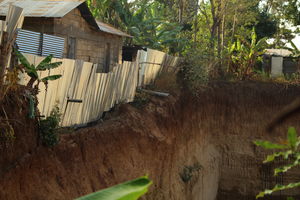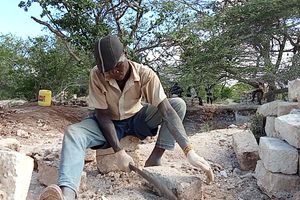
Aftermath of uncontrolled mining activities in Ongata Rongai within residential areas.
On January 24, John Madahana Mwenesi dashed out of his Rankau village home in Kajiado East sub-County to fetch water in a nearby abandoned quarry.
Little did his wife Sheila Mubone know that that was the last time she would see her 38-year-old husband alive. He drowned few minutes later.
The grieving mother of four told the Nation that her husband, a boda boda rider, had gone to fetch water for their small vegetable garden when tragedy struck at around 8am.
"My husband rode on his motorcycle to the flood-filled quarry two miles away. As he left, I went to the nearby shop for milk and went back to the house,” she said.
"When he unusually overstayed, I sensed danger and went to check on him. I found two of his water jerrycans floating in the quarry. Four more jerrycans and his motorcycle were at the shores of the quarry. He was missing,"
After Ms Mubone raised a distress call, it took five hours for local divers, in collaboration with residents to retrieve the body, currently being preserved at Ong'ata Rongai sub-County Hospital mortuary.
"We are barely six months in this neighborhood. We had just bought a plot and constructed a house. The dangerous quarry has snatched my husband, a friend and the father of my children,” Ms Mubone said.
The family is planning for an autopsy examination to rule out any foul play, insisting the deceased frequented the quarry at least twice a day to fetch water.

Aftermath of uncontrolled mining activities in Ongata Rongai within residential areas.
Barely 20 kilometers from their home in Olololua Ward, Kajiado North sub-County, two families are mourning their daughters whose bodies were recovered from abandoned quarries on January 20 and 21.
The friends aged 13, Ashley Wairimu and Precious Nderema, went missing on January 19 without a trace. Their lifeless bodies were recovered in an abandoned quarry after days of frantic search.
Hillary Njogu, Ashley's father, told the Nation that he sensed foul play and was not ready to buy the theory that his daughter drowned.
"I know what drowning looks like. Am a swimming trainer. The signs are not there. This wasn’t an accident. Someone did this to her,” said Mr Njogu.
The body finds in abandoned quarries, which have sent shockwaves across the sub-county, have raised concerns about dozens of abandoned in Kajiado North Sub County and its environs.
The three deaths in a week have reopened wounds of similar incidents, with indicators suggesting likelihood of the abandoned quarries being death traps and secret dumping grounds for murderers and other criminals.

Residents of Rankau village, Kajiado East Sub county mills around flood filled on January 24, 2024 where Mr John Modahana had drowned. His body was recovered later.
According to Isinya and Kajiado North Sub Counties local administration reports gathered by Nation, in the last six months, at least 10 bodies are said to have been retrieved from floods-filled and abandoned quarries, with Gataka and Ololua bearing the blunt.
Notably, the first Ololua Ward Representative George Nyoike died in 2015 when his vehicle veered off the road into an unmanned quarry.
"Police officers usually collect the bodies. I can confirm at least 10 bodies have been recovered in Kajiado North and East sub counties in the last six months," said a local chief who has been at loggerheads with police over body dumps and discoveries in his area.
Kajiado County boasts of the biggest quarries that feed the construction industry in the capital Nairobi and environs— making mining and quarrying some of the most lucrative enterprises in the region.
A Nation spot check in both Kajiado North and East sub counties on Saturday laid bare multiple abandoned quarries that were left unattended after the excavation of raw materials by both local and international companies.
Most of these unmanned quarries are at least 30-50 meters deep, wide open and filled with flood water to capacity.
In some neighborhoods, they serve as water reservoirs for farming and domestic.
Tuala village residents in Kajiado East Sub county narrated their anguish after murram quarries were left unattended by Standard Gauge Railway (SGR) contractors several years ago.
‘’The project left us suffering yet the relevant authorities have been quiet about it. Several livestock have recently died in the dams and we fear criminals could be using the quarries to dump bodies of their victims,” said Mr John Mambo, a Tuala resident.
Deep gaping holes have been left unattended posing a great danger to the locals. Dozens of abandoned quarries spread all over Kajiado North and East Sub counties in both private and communal lands.
Kajiado North MP Onesmus Ngogoyo put on the spot the National Environment Management Authority (NEMA) and County Government of Kajiado for laxity in implementing the law.
"In the last six months, we have lost four children in Gataka in abandoned dams. The environment watchdog is asleep as more people die, “he said.
"The county government collects cess from the quarries but they seemingly don't care what happens thereafter.”
His sentiments were echoed by Olololua Ward Representative Eli Gor, who accused Nema and county government officers of complicity by allowing individuals to set up illegal mining centre within residential areas.
"We are tired of the series of deaths in quarries. We squarely blame Nema for a well-entrenched corruption scheme. They by- pass safety measures and refilling of the multiple abandoned quarries after excavations. We will be demanding compensation from Nema for all lost lives,“ said Mr Gor.
Kajiado County Nema Director Mark Angwenyi told the Nation that the environment watchdog would move with speed to address the grave matter.
"The matter has been brought to our attention, we are seeking to reach out to all land owners through a multi-agency approach, and have them fence off or rehabilitate the sites that are not in use. This approach will provide a lasting solution, “Said Mr Angwenyi.
Kajiado County Executive in charge of Water, Environment, Climate Change and Natural Resources Michael Semera said the department had established that 90 percent of quarries in the county had breached environmental regulations and standards.
"The series of drowning cases are worrying. We are going to close down all illegal quarries. Those with abandoned quarries sites will be forced to fence them off or fill them with soil,” said Mr Semera.










